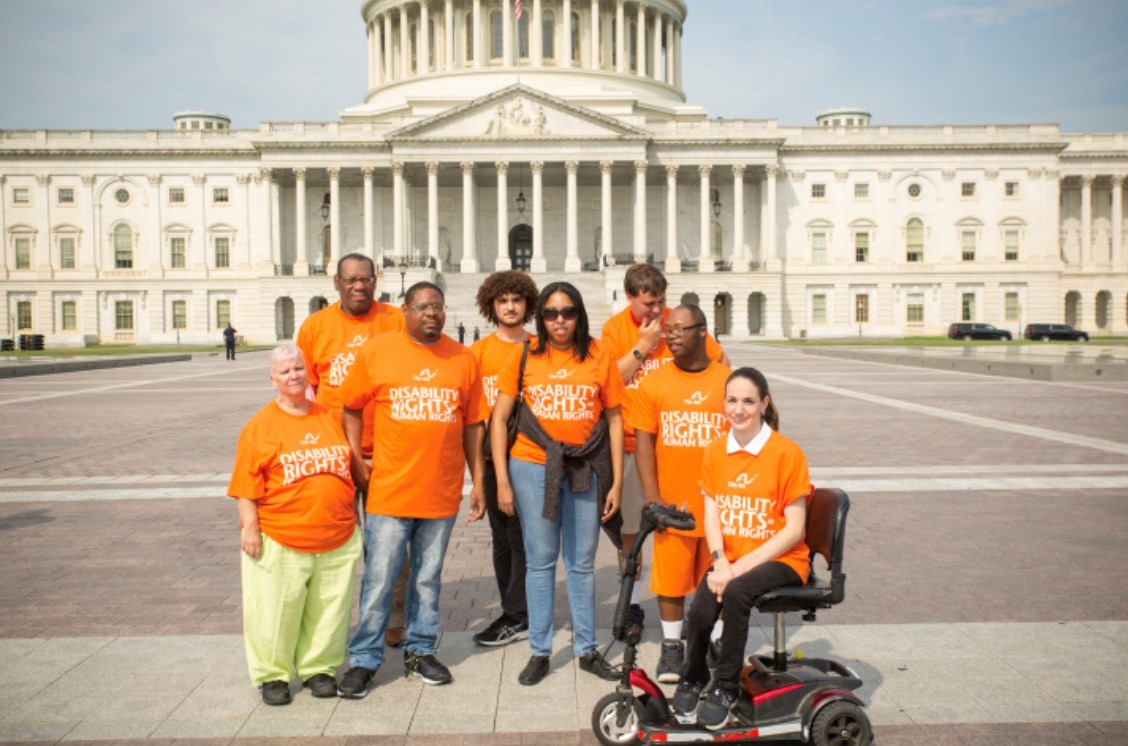July 26, 2023
The Disability Docket: What’s at Stake at the U.S. Supreme Court for People with Disabilities?
Senior Director of Legal Advocacy & General Counsel at The Arc

On July 26, we will celebrate the 33rd anniversary of the Americans with Disabilities Act (ADA), a law that was enacted to prohibit discrimination against individuals with disabilities in all areas of public life, including jobs, schools, transportation, government programs and services, and all places open to the public. In many ways, the COVID-19 pandemic, in exacerbating existing inequities, has made society at large more aware of the barriers faced by people with disabilities, particularly people of color with disabilities, and the life-or-death consequences such discrimination can entail during a time of crisis. During the pandemic, disabled activists also raised awareness of the reality that so many accommodations long sought by and often denied to disabled people, such as remote work and other virtual participation options, were, in fact, eminently achievable and preferred by many with and without disabilities alike.
But so much work remains to be done in achieving widespread understanding and awareness of the barriers facing people with disabilities and in realizing the full promise of the ADA in the daily lives of people with disabilities. Following improved access to elections for many voters with disabilities during the pandemic, we have seen multiple states enact large scale voter suppression laws that systemically disenfranchise voters with disabilities. Too many students with disabilities remain segregated in their schools and receive inferior education and harsh discipline that too often leads to the school-to-prison pipeline. Places of public accommodation too frequently remain inaccessible to people with disabilities, leading to ruined trips, meetings, and events. Airlines regularly recklessly mishandle, break, and lose travelers’ wheelchairs, with little accountability to address the immense harm and cost imposed by these actions.
With over 60 million people living with a disability in the United States, the field of disability law has grown exponentially in the 33 years since the ADA was enacted, but the topic of disability rights too often remains marginalized in broader discussions of civil rights law. When it comes to the Supreme Court, incredibly consequential cases pertaining to the rights of millions with disabilities are often overlooked by the media and legal scholars. In a recently published article in the American University Law Review titled “The Disability Docket” and co-authored with legal scholars Jasmine Harris and Karen Tani, we highlight (1) the role of disability cases in the retrenchment of civil rights; (2) the vast and underappreciated effects that certain “non-disability” cases are likely to have on people with disabilities; and (3) the difficult choices that disability law litigators and advocates face when disability law cases end up before the Supreme Court. Throughout the Article, we suggest legal areas that would benefit from further examination through a “disability lens.”
Two cases from the 2022-2023 and one in the upcoming term are illustrative of the stakes involved for people with disabilities before the Court.
In Health and Hospital Corporation of Marion County, Indiana v. Talevski, the family of Gorgi Talevski sued his nursing home, alleging that he was abused in violation of the Federal Nursing Home Reform Act (FNHRA), which applies to all nursing homes that receive federal Medicaid funds. After a district court dismissed the case and the Seventh Circuit reversed, the defendants sought Supreme Court review, urging the Court to disallow the use of Section 1983 to enforce the terms of the FNHRA and to find that Spending Clause legislation in general is not privately enforceable under Section 1983 (a position that would require reversing decades of precedent). Had the Court accepted the defendants’ argument, residents of state-run, federally-funded nursing homes would have lost what has historically been their best vehicle for holding those facilities accountable when they violate federal standards and a host of federal-state programs involving food assistance, income support, healthcare, and more would have been impacted. The disability community weighed in with public education campaigns and amicus briefs explaining the stakes of the litigation for millions with disabilities. Ultimately, the Court held in favor of Talevski and stated that the FNHRA “unambiguously” creates rights enforceable under Section 1983, a critical win upholding a private right of action as essential in the access, accountability, and antidiscrimination of our country’s Medicaid and other safety net programs. Complex government systems too frequently fail to help the people who need them most and private lawsuits remain one of the only ways beneficiaries can meaningfully enforce their rights. This decision also ensures there is accountability for service providers which has a direct impact on the quality of services and supports that millions count on.
Perez v. Sturgis Public Schools had the potential to narrow existing individual and collective rights in that it addressed how many administrative hurdles a plaintiff might have to clear before seeking relief for a civil rights violation directly in federal court. Perez, the plaintiff, is a deaf student who was assigned an aide from his school district to translate classroom instruction into sign language. He alleged the aides he received were unqualified or absent from the classroom for hours. Over the course of a decade, the school district allegedly misrepresented Perez’s educational progress, leading his parents to believe he was on track to graduate from high school. Then, months before graduation, the district informed Perez that he would not receive a diploma. Perez and his family filed an administrative complaint under the Individuals with Disabilities Education Act (IDEA) against the district and reached a settlement prior to the administrative hearing. Perez then filed a lawsuit in federal district court under the ADA seeking compensatory damages, which Sturgis defended against by arguing that Perez could not bring an ADA claim without first exhausting the IDEA’S administrative procedures. The district court dismissed Perez’s lawsuit on these grounds and the Sixth Circuit affirmed. The Supreme Court granted certiorari to address the extent to which families of children with disabilities must exhaust administrative procedures under the IDEA before seeking relief under other federal antidiscrimination statutes, such as the ADA. Although the Court ultimately reversed the Sixth Circuit, helpfully clarifying that the IDEA’s exhaustion requirement does not preclude a student in Perez’s position from moving forward with an ADA lawsuit, the oral argument surfaced at least one troubling point, regarding the availability of damages post Cummings. Ultimately, the case is an important victory for disabled students who face a multitude of barriers in getting the supports they need to thrive in school – these barriers include overt segregation and discrimination and force parents to become experts in advocacy and the law in order to get the education their children are entitled to. The decision helps to remove unnecessary burdens from families seeking relief and helps ensure that students with disabilities and their families are able to pursue every avenue of justice available to them when their civil rights are violated.
Lastly, the Court recently granted certiorari in Acheson Hotels, LLC v. Laufer, in which petitioners raise the question of whether an ADA “tester” has Article III standing to challenge a place of public accommodation’s failure to provide disability accessibility information on its website, if that tester lacks any intention of visiting that place of public accommodation. Laufer is disabled, with impaired vision and limited use of her hands; she uses a wheelchair or cane to ambulate. She has a number of accessibility needs with respect to hotels, including accessible parking, passageways that fit her wheelchair, lowered surfaces, and bathroom grab bars. Searching the Acheson Hotels website for information pertinent to her needs, Laufer found that the site did not identify accessible rooms, did not provide an option for booking an accessible room, and did not give her sufficient information to determine whether the rooms and features of the hotel were accessible to her. Laufer sued, alleging discrimination under Title III of the ADA and arguing that Acheson Hotels’ failure to include accessibility information on its website “deprives her of ‘the ability to make a meaningful choice’” and causes her to “suffer ‘humiliation and frustration at being treated like a second class citizen, being denied equal access and benefits to . . . accommodations and services.’” Acheson Hotels moved to dismiss, arguing that, because Laufer never intended to book a room at its hotel, she lacked standing to bring her suit. The district court dismissed the case on standing grounds, but the First Circuit reversed. The petition to the Supreme Court encapsulates a narrative that has become central to public understandings of disability civil rights laws. Although Congress designed the ADA with private enforcement in mind, the citizens who do this enforcement work are sometimes portrayed as self-interested vigilantes who prey especially on small businesses. In Acheson Hotels’ telling, Laufer is part of “[a] cottage industry ... in which uninjured plaintiffs lob ADA lawsuits of questionable merit, while using the threat of attorney’s fees to extract settlement payments.” Acheson Hotels also suggests that the most notable results of such efforts have not been to vindicate the ADA’s purposes, but rather to “burden[] small businesses, clog[] the judicial system, and undermine[] the Executive Branch’s exclusive authority to enforce federal law.” Laufer, in contrast, characterizes “testers” as simply bringing to light longstanding discriminatory practices of public accommodations, as well as a class of businesses that has affirmatively chosen to wait to be sued rather than comply with the clear mandates of a now decades-old law. Laufer also notes that without “testers,” the ADA would go radically underenforced, because of the law’s lack of allowance for damage awards. The case is set for oral argument on October 4.
These are but a few cases in the Court’s recent and upcoming terms that have significant impacts for people with disabilities and federal disability rights laws. As discussed in our article, there are a myriad of other cases, both disability-specific and otherwise, that are relevant to this discussion, including: Cummings v. Premier Rehab Keller, P.L.L.C., (holding that emotional distress damages are not available under Section 504 of the Rehabilitation Act and the Affordable Care Act); Marietta Memorial Hospital Employee Health Benefit Plan v. DaVita Inc. (holding that the Medicare Secondary Payer statute does not authorize disparate-impact liability); United States v. Vaello Madero (holding that the Constitution does not require Congress to extend Supplemental Security Income benefits to residents of Puerto Rico); Dobbs v. Jackson Women’s Health Organization (holding that the Constitution does not confer a right to abortion); West Virginia v. Environmental Protection Agency (holding that Congress did not grant the Environmental Protection Agency the authority to devise emissions caps in the way it did in the Clean Power Plan); and Allen v. Milligan (holding that Plaintiffs demonstrated a reasonable likelihood of success on their claim that the districting plan adopted by Alabama for its 2022 congressional elections likely violated Section 2 of the Voting Rights Act).
As we discuss in our article, this “disability docket” matters for disabled people seeking access, inclusion, and remedies for harm, but it also has wider implications and shows how central the concept of disability is to the current legal landscape:
[A]pplying a disability lens can yield rich and important insights—about trends in contemporary jurisprudence and their real-world effects; about the experiences of people who identify as disabled or are so labeled; and about the current workings of the concept of disability, a malleable and manipulable term that has had various meanings and uses throughout U.S. history.
As we celebrate the ADA’s 33rd anniversary, it is a good opportunity to apply this “disability lens”—a dimension of legal analysis that is too often marginalized or omitted—to the Court’s recent jurisprudence.
_________________________
 Shira Wakschlag is the Senior Director of Legal Advocacy and General Counsel at The Arc.
Shira Wakschlag is the Senior Director of Legal Advocacy and General Counsel at The Arc.




